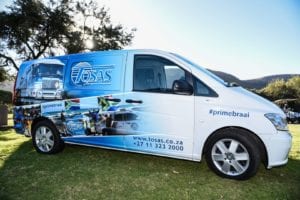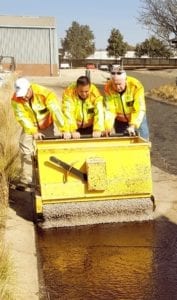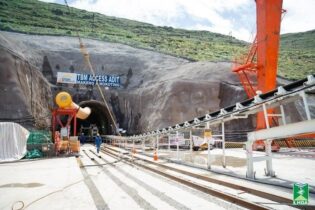What does the slogan “Binding roads, linking people” represent for Tosas?
WT Tosas has been supplying and applying road binders for 45 years. However, we feel we do a lot more than just supply products. We build long-term relationships with our customers and our products help to link towns and communities, in the process interconnecting businesses and services, especially in remote areas previously not accessible by road. That’s why we recently added a second slogan, over and above our main one, which is “Binder Excellence”. Our additional slogan is “Binding roads, linking people”. Both of our slogans totally encapsulate our business and what we are about!What’s unique in terms of Tosas’ solutions?
We are constantly innovating and spend a lot of time and energy in our internal R&D Department – not only for product developments, but also in terms of equipment and technological improvements. In July 2017, we launched our new Chipseal™ emulsion. Chipseal™ is a modified cationic emulsion designed to stop run-off and allow for more binder to be applied than is conventionally possible with emulsion. This provides so many advantages for not only winter work, but also for labour-intensive resurfacing. We are also pleased to announce that our Ralumac® machines are currently undergoing final commissioning after the SABS homologation process and the first trials are taking place as we speak. We have, however, already successfully applied Ralumac® microsurfacing, as well as rut filling in the Komatipoort area, through one of our sister companies that also owns a machine capable of Ralumac® application. We are extremely proud to have the Ralumac® name as part of our product range and we look forward to many roads being given a second life through this superior product. On the bitumen rubber side and after many years of planning, research and application, it appears likely that our NCRT™ could be included in an addendum to the TG1 document in the not-too-distant future, and more than likely in the new categories of S-R2 and A-R2. These are major milestones and a feat we are truly proud of and will pave the way for the application of high-quality rubber bitumen as a preferred binder onto many more roads in South Africa than was previously possible.Has NCRT™ (or A-R2/S-R2) been supplied on recent contracts?
Yes, we have successfully completed a number of contracts with NCRT™ to date, including some that were Sanral projects. In line with the benefits of NCRT™, all of these contracts were supplied from three fixed plants, while the contracts were scattered across almost all South Africa’s provinces. In August 2017, we will be commencing a new flagship contract with Much Asphalt and Roadmac Surfacing Cape for the Western Cape Department of Transport and Public Works between Rooi Els and Gordon’s Bay. This contract will require in excess of20 000 t of A-R2 asphalt to be supplied by Much Asphalt from their Eerste Rivier plant.
What are prospects like in South Africa, as well as the cross-border market?
 Since Tosas was taken over by its new shareholder more than four years ago, we’ve focused heavily on regaining lost ground in the South African market. This was no easy task and was (and still is) very challenging within the current environment. We’ve worked very hard to restore customer confidence in the company and we believe we have become the preferred supplier in the market once again. This, however, places continuous pressure on us to always maintain the position we’ve achieved through dedication and commitment, while we continuously improve and build our brand.
Alongside our South African operations, Tosas does supply into the African market and we have branches in Namibia and Botswana. We also export products to many other SADC countries. We plan to increase our footprint and network in Africa and look forward to being a lot more involved going forward.
Since Tosas was taken over by its new shareholder more than four years ago, we’ve focused heavily on regaining lost ground in the South African market. This was no easy task and was (and still is) very challenging within the current environment. We’ve worked very hard to restore customer confidence in the company and we believe we have become the preferred supplier in the market once again. This, however, places continuous pressure on us to always maintain the position we’ve achieved through dedication and commitment, while we continuously improve and build our brand.
Alongside our South African operations, Tosas does supply into the African market and we have branches in Namibia and Botswana. We also export products to many other SADC countries. We plan to increase our footprint and network in Africa and look forward to being a lot more involved going forward.
Would Tosas ever consider becoming a road surfacing contractor?
No, most definitely not. We see ourselves purely as suppliers to the industry and will not enter into the construction side of the industry. In other words, we never wish to compete with our clients. It is only on the Ralumac® microsurfacing side that we get more actively involved in the application process, since the licensed product requires total control of all aspects if the associated warranties are to be applicable. Over the past four years, our customers have seen and experienced our supplier commitment and they do appreciate that. Hence our increased base of loyal customers in what is an extremely competitive environment.What are some of the key challenges facing the roads sector?
One of the most challenging issues we face as suppliers of bituminous products is the so called “winter embargo”. This limits the period during which the road industry is allowed to seal on a large scale with the more commonly accepted ‘summer products’. The ‘embargo’ is, however, regrettably unnecessarily applied, since it has been accepted by road owners that sufficient products are available to overcome challenges experienced in winter time. The limitation that has been imposed or adopted by the industry is really for fear of encountering negative results due to a cold-climate application of binders. There are numerous ways and various products that enable us to do winter seals and many kilometres have been sealed historically, with, for example, winter-grade bitumen rubber. By applying the right techniques and products, there is, therefore, no reason why we cannot surface more roads in the winter period. Implementing this will give customers and contractors a wider sealing window and alleviate any bottlenecks with bitumen supply during the summer months, ultimately allowing more roads to be surfaced per year across the country, something I’m sure every person is in favourof across the industry. Our Tosas team recently had the privilege of undergoing a seal training session with veteran engineer Adrian Bergh, and I will never forget his words, “We have built some of the best seals in the middle of the winter in the middle of the Free State.” He maintains that it is “nonsense” to have an embargo – you should just select the correct products and know what the constraints are!









